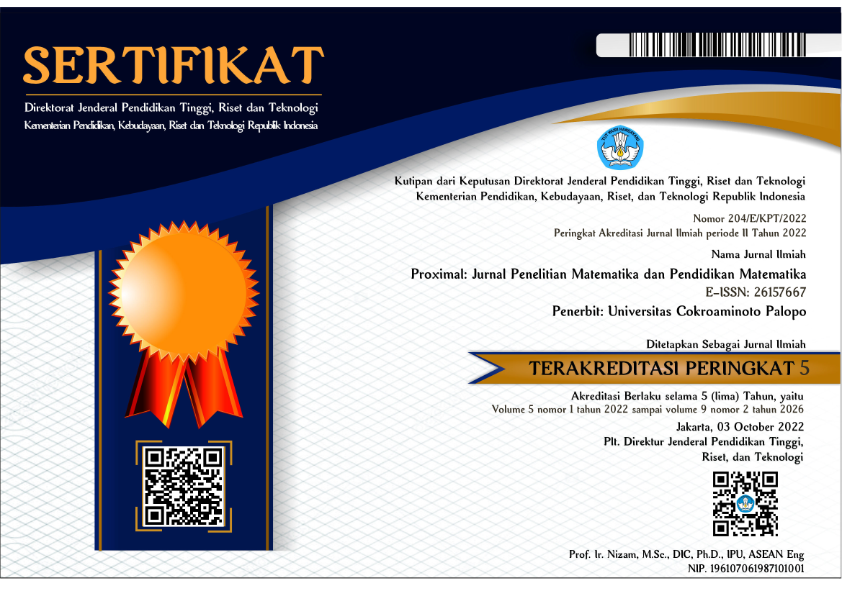THE EFFECT OF ONLINE LEARNING USING ONLINE MEDIA ON LEARNING ACHIEVEMENT
DOI:
https://doi.org/10.30605/proximal.v5i1.1546Keywords:
Online Media, Online Learning, Learning AchievementAbstract
The purpose of this study was to determine the effect of online learning using online media on learning achievement. This type of research uses quantitative descriptive methods and the subjects of this research are 4th semester students at STKIP Kumala Lampung Metro which is conducted online. In this study, the online media used included applications such as Google Classroom, WhatsApp and YouTube. The results of this study indicate that the t-count value for online media is 4.012 with a significance level of 0.001, the online media variable has a positive and significant effect on the t-count value (4.012) > t table (2.101) and significant value (0.001) <0.05 . So it can be concluded that there is a significant influence between online media variables (X) on learning achievement (Y)Downloads
References
A, J. C., B, K. B., & H, S. L. (2020). COVID-19: 20 countries’ higher education intra-period digital pedagogy responses. Journal of Applied Learning & Teaching, 3(1). https://doi.org/10.37074/jalt.2020.3.1.7
Andiani, W., & Fitria, H. (2021). Pembelajaran Daring Menggunakan Media Online Selama Pandemi Covid-19 Pada Siswa Sd Negeri 103. 172–181.
Azis, A. A. (2015). Pengembangan Media E-Learning Berbasis LMS Moodle pada Matakuliah Anatomi Fisiologi Manusia. Jurnal Pendidikan Biologi, 7(1), 1–8. http://journal2.um.ac.id/index.php/jpb/article/view/712
Elisvi, J., Archanita, R., Wanto, D., & Warsah, I. (2020). Analisis Pemanfaatan Media Pembelajaran Online Di Smk It Rabbi Radhiyya Masa Pandemi Covid-19. Al-Tarbawi Al-Haditsah: Jurnal Pendidikan Islam, 5(2), 16–42. https://doi.org/10.24235/tarbawi.v5i2.6721
Faulinda, E. N., & Aghni Rizqi Ni’mal, ‘Abdu. (2020). Kesiapan Pendidikan Indonesia Menghadapi era society 5.0. Edcomtech : Jurnal Kajian Teknologi Pendidikan, 5(1), 61–66.
Fitriawan, D. (2020). Pengembangan Bahan Ajar Aljabar Linear Elementer Berdasarkan Kemampuan Koneksi Matematis. Jurnal Pendidikan Matematika Dan Sains, 6(1), 93–104. https://journal.uny.ac.id/index.php/jpms/article/view/21223/pdf
Fitriawan, D., Siregar, N., Pasaribu, R. L., & Tanjungpura, U. (2021). Problematika dalam menilai sikap peserta didik pada pembelajaran daring. Prosiding Seminar Nasional RCI, 2019–2022.
Flora Siagian, R. E. (2015). Pengaruh Minat dan Kebiasaan Belajar Siswa terhadap Prestasi Belajar Matematika. Formatif: Jurnal Ilmiah Pendidikan MIPA, 2(2), 122–131. https://doi.org/10.30998/formatif.v2i2.93
Ichsan, I. Z., Rahmayanti, H., Purwanto, A., Sigit, D. V., Irwandani, I., Ali, A., Susilo, S., Kurniawan, E., & Rahman, M. M. (2020). COVID-19 Outbreak on Environment: Profile of Islamic University Students in HOTS-AEP-COVID-19 and PEB-COVID-19. Tadris: Jurnal Keguruan Dan Ilmu Tarbiyah, 5(1), 167–178. https://doi.org/10.24042/tadris.v5i1.6283
Ju, J., Wei, S. J., Savira, F., Suharsono, Y., Aragão, R., Linsi, L., Editor, B., Reeger, U., Sievers, W., Michalopoulou, C., Mimis, A., Editor, B., Ersbøll, E., Groenendijk, K., Waldrauch, H., Waldrauch, H., Bader, E., Lebhart, G., Neustädter, C., … Saillard, Y. (2020). Efektivitas PembelajaranD Daring Dalam Pembelajaran Bahasa Indonesia Di Kelas II A MI Unggulan Miftahul Huda Tumang Cepogo Boyolali. Journal of Chemical Information and Modeling, 43(1), 7728. https://online210.psych.wisc.edu/wp-content/uploads/PSY-210_Unit_Materials/PSY-210_Unit01_Materials/Frost_Blog_2020.pdf%0Ahttps://www.economist.com/special-report/2020/02/06/china-is-making-substantial-investment-in-ports-and-pipelines-worldwide%0Ahttp://
Mandayu, A. G. (2018). Respon Siswa Terhadap Media E-Learning Berbasis Web Blog Materi Sistem Pernapasan Kelas Viii Smp. Artikel Penelitian.
Maulidina, L., Mardiana, T., & Supriyatna, A. (2021). Analisis Metode Pembelajaran Ipa Dalam Pembelajaran Jarak Jauh Saat Wabah Covid-19 Di Sekolah Dasar. Khazanah Pendidikan, 15(1), 42. https://doi.org/10.30595/jkp.v15i1.9838
Nurhayati, S., Wicaksono, M. F., Lubis, R., Rahmatya, M. D., & Hidayat, H. (2020). Peningkatan Kemampuan Guru Dalam Pembelajaran Daring Dengan Memanfaatkan Teknologi Informasi Bagi Guru SMA Negeri 5 Cimahi Bandung. Indonesian Community Service and Empowerment (IComSE), 1(2), 70–76. https://doi.org/10.34010/icomse.v1i2.3878
Raharja, S., Prasojo, L. D., & Nugroho, A. A. (2011). Model Pembelajaran Berbasis Learning Manajement System. 41, 55–70.
Sulistyowati, E. (2016). Pengaruh Model Pembelajaran Kooperatif Tipe Two Stay Two Stray dan Numbered Head Together Terhadap Prestasi Belajar. Perpustakaan.Uns.Ac.Id, 147, 11–40.
Tahar, I. (2006). Hubungan Kemandirian Belajar Dan Hasil Belajar Pada Pendidikan Jarak Jauh. Jurnal Pendidikan Terbuka Dan Jarak Jauh, Volume. 7, Nomor 2, September 2006, 91-101 Proses.
Tatminingsih, S. (2020). Teaching Practice Patterns in ECE Teacher Program in Distance Education in Indonesia. Jurnal Obsesi : Jurnal Pendidikan Anak Usia Dini, 5(1), 857–868. https://doi.org/10.31004/obsesi.v5i1.599
Vania Sasikirana, & Herlambang, Y. T. (2017). Urgensi Merdeka Belajar Di Era Revolusi Industri 4.0 Dan Tantangan Society 5.0. Seminar Nasional: Jambore Konseling 3, 00(00), XX–XX. https://doi.org/10.1007/XXXXXX-XX-0000-00
Wardah, W. (2014). Metacognitive Reading Strategy Enhancing English Reading Comprehension. At-Turats, 8(1). https://doi.org/10.24260/at-turats.v8i1.107
Yodha, S., Abidin, Z., & Adi, E. (2019). Persepsi Mahasiswa Terhadap Pelaksanaan E-Learning Dalam Mata Kuliah Manajemen Sistem Informasi Mahasiswa Jurusan Teknologi Pendidikan Universitas Negeri Malang. Jurnal Kajian Teknologi Pendidikan, 2(3), 181–187. https://doi.org/10.17977/um038v2i32019p181
Downloads
Published
How to Cite
Issue
Section
License
In submitting the manuscript to the journal, the authors certify that:
- They are authorized by their co-authors to enter into these arrangements.
- The work described has not been formally published before, except in the form of an abstract or as part of a published lecture, review, thesis, or overlay journal.
- That it is not under consideration for publication elsewhere,
- That its publication has been approved by all the author(s) and by the responsible authorities – tacitly or explicitly – of the institutes where the work has been carried out.
- They secure the right to reproduce any material that has already been published or copyrighted elsewhere.
- They agree to the following license and copyright agreement.
License and Copyright Agreement
Authors who publish with this journal agree to the following terms:
- Authors retain copyright and grant the journal right of first publication with the work simultaneously licensed under Creative Commons Attribution License (CC BY 4.0) that allows others to share the work with an acknowledgment of the work's authorship and initial publication in this journal.
- Authors are able to enter into separate, additional contractual arrangements for the non-exclusive distribution of the journal's published version of the work (e.g., post it to an institutional repository or publish it in a book), with an acknowledgment of its initial publication in this journal.
- Authors are permitted and encouraged to post their work online (e.g., in institutional repositories or on their website) prior to and during the submission process, as it can lead to productive exchanges, as well as earlier and greater citation of published work.















